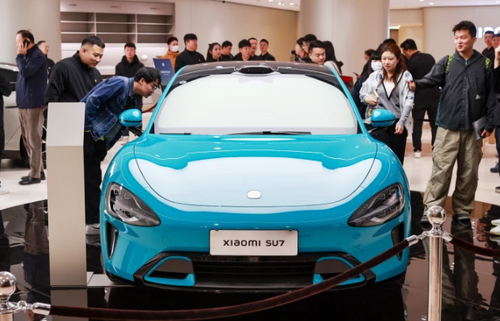The competition in China's EV world continues to heat up, as the market becomes more and more saturated.
The country's automakers are aggressively trying to take advantage of Tesla's recent price hikes by offering incentives, while at the same time gearing up to compete with the "disruptive" entry of Xiaomi into the market, Bloomberg reported this week.
The report notes that on April 1, Shanghai-based Nio unveiled an incentive plan worth up to 1 billion yuan ($186.4 million) to encourage gasoline vehicle owners to switch, offering perks like battery swaps, extra driving function subscriptions, and a Nio smartphone.
At the same time, Xpeng reduced prices on certain vehicles by up to 20,000 yuan, and Chery Automobile introduced free purchase tax on select models and improved trade-in values.
The heavy promotions stand at odds with Tesla's strategy in China, which saw the automaker increase its Model Y SUV price, a move previously hinted to boost pre-hike demand and sales.
However, despite anticipation of the price rise, Tesla had to cut production at its Shanghai facility due to falling shipments in early 2024, highlighting the fierce competition in China's vast car market.
Xiaomi has now also entered the competitive EV market, announcing its new SU7 model's pricing and beginning to accept orders last week. The launch was met with enthusiasm, garnering over 88,898 pre-orders within the first 24 hours, as reported on Xiaomi's social media.
Recall we wrote just days ago that Nissan is the latest manufacturer to aim to cut EV costs in order to keep up with an increasingly competitive and saturated landscape. The company is now seeking to compete with Chinese rivals by slashing costs by 30%, Financial Times reported last weekend.
Similarly, we have noted that auto companies are slashing investment in EVs, as is the case with American auto manufacturers like Ford and GM. We wrote last month that Joe Biden's vision for EVs across America is in "full collapse".
As we wrote then: "Meanwhile, the higher costs are driving automakers away from EVs. And as battery material requirements are set to double by 2027, fulfilling these mandates will be increasingly difficult, putting Biden's ambitious EV strategy at risk."
At least for now, however, it looks like Tesla and BYD will continue to lead the charge and, likely, command the pricing power that goes with it in China.
Source link


